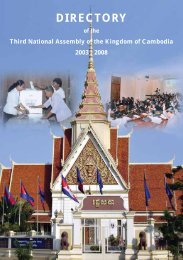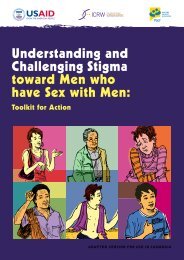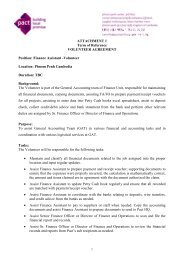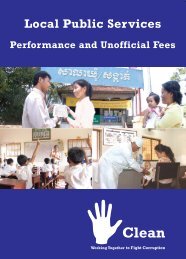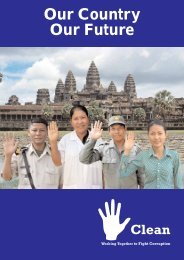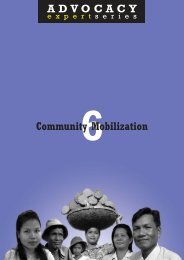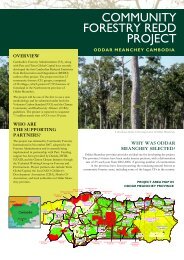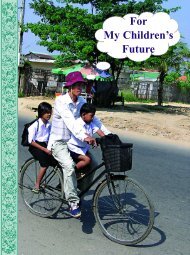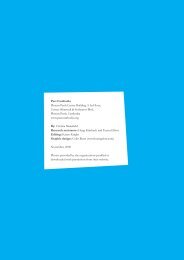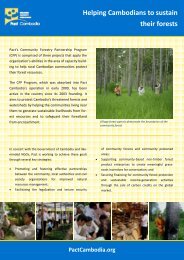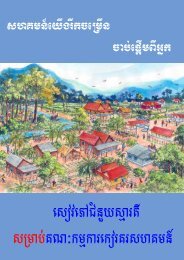Advocacy in Cambodia: Increasing Democratic ... - Pact Cambodia
Advocacy in Cambodia: Increasing Democratic ... - Pact Cambodia
Advocacy in Cambodia: Increasing Democratic ... - Pact Cambodia
Create successful ePaper yourself
Turn your PDF publications into a flip-book with our unique Google optimized e-Paper software.
local authorities have refused permission. At one<br />
time, it was very difficult for community leaders<br />
to obta<strong>in</strong> meet<strong>in</strong>gs with district leaders. Recently,<br />
the situation has changed considerably as<br />
relationships improved dur<strong>in</strong>g the mid- to late-<br />
1990s, and squatters can now usually get the<br />
permission they need. In at least one example,<br />
local authorities even made a contribution to an<br />
<strong>in</strong>frastructure project <strong>in</strong> a squatter neighborhood.<br />
These positive trends notwithstand<strong>in</strong>g, NGOs are<br />
currently reassess<strong>in</strong>g the relationship between<br />
authorities, NGOs, and urban poor groups, <strong>in</strong> light<br />
of the authorities’ treatment of squatter residents<br />
after the Tonle Bassac fires of 2001.<br />
Fires burn <strong>in</strong> the Build<strong>in</strong>g area of the Tonle Bassac<br />
squatter community, May 2001.<br />
Case Studies<br />
Tonle Bassac Fires<br />
In May and December of 2001, two fires<br />
destroyed large parts of the squatter communities<br />
<strong>in</strong> Tonle Bassac <strong>in</strong> the area known as Build<strong>in</strong>g,<br />
opposite the Bondos Vichea Primary School. The<br />
fires, which are generally accepted to have been<br />
started <strong>in</strong>tentionally, left 20,000 people homeless.<br />
The Municipality’s subsequent handl<strong>in</strong>g of the<br />
crisis has eroded the trust of NGOs and aroused<br />
their suspicions.<br />
The day after the first fire <strong>in</strong> Bondos Vichea,<br />
LICADHO, the Urban Sector Group (USG), and<br />
others distributed emergency supplies at the fire<br />
site. From that po<strong>in</strong>t on, the Municipality began<br />
send<strong>in</strong>g mixed messages regard<strong>in</strong>g permission to<br />
contribute emergency supplies, and after a few<br />
days declared that supplies could only be<br />
distributed at the relocation site at Chung Ruk<br />
(Samaki) (though some NGOs distributed supplies<br />
to communities from their offices). After the<br />
second fire <strong>in</strong> December, the Municipality aga<strong>in</strong><br />
refused permission to donate emergency supplies<br />
to victims at the fire site, though distribution did<br />
take place <strong>in</strong> pagodas and other places away from<br />
the site. NGOs protested the Municipality’s<br />
prohibition and felt that the government should<br />
have allowed erection of emergency shelters at the<br />
fire site while the relocation area was prepared.<br />
Even so, NGOs wanted to help fire victims<br />
and s<strong>in</strong>ce the only way to do so was to provide<br />
assistance at the relocation site, they <strong>in</strong>advertently<br />
helped to legitimize the government’s policy.<br />
UNCHS, <strong>in</strong> comply<strong>in</strong>g with government demands<br />
and help<strong>in</strong>g to prepare the relocation site after the<br />
first fire, also set a negative precedent. Thus, when<br />
the second fire occurred, the government issued<br />
the same restrictions. The government transferred<br />
fire victims to a rice field until UNDP protested<br />
based on the lack of plann<strong>in</strong>g and adequate<br />
facilities at the transfer site.<br />
The scale of the Tonle Bassac fires acted as a<br />
catalyst for urban-sector NGOs. The first fire <strong>in</strong><br />
Bondos Vichea affected 547 families, while the<br />
second fire <strong>in</strong> Bassac/Chbar Ampeu affected more<br />
than 3,200 families. The crisis drew attention to<br />
the problem of squatters and spurred NGOs to<br />
consider issues related to the urban poor more<br />
seriously.<br />
As with many tragedies however, the<br />
<strong>in</strong>creased attention dissipated quickly. Although<br />
there were eleven urban community development<br />
NGOs monitor<strong>in</strong>g the second fire and URC<br />
organized a press conference to protest the<br />
Municipality’s handl<strong>in</strong>g of the crisis, there appears<br />
to have been no concerted effort to <strong>in</strong>fluence<br />
government policy or practices. The press<br />
conference received some media attention and<br />
may have raised public awareness, but <strong>in</strong> the end<br />
the decision to relocate all fire victims rema<strong>in</strong>ed<br />
unchanged.<br />
Widen<strong>in</strong>g of National Route 1 and<br />
Resettlement Compensation<br />
When the Asian Development Bank (ADB)<br />
entered <strong>in</strong>to a contract with the <strong>Cambodia</strong>n<br />
government to provide a loan for the rehabilitation<br />
of National Route 1, the contract <strong>in</strong>cluded a<br />
stipulation regard<strong>in</strong>g compensation of residents<br />
affected by the road-widen<strong>in</strong>g project. In addition,<br />
a separate clause required that an NGO be<br />
assigned to monitor the project. Separately, a<br />
group of NGOs under the umbrella of the NGO<br />
Forum conducted their own <strong>in</strong>dependent<br />
monitor<strong>in</strong>g. The various NGOs <strong>in</strong>volved <strong>in</strong><br />
monitor<strong>in</strong>g were not used to hav<strong>in</strong>g different<br />
agencies work<strong>in</strong>g on the same issue and it took<br />
some time for NGOs to realize that each group had<br />
an important and separate role to play.<br />
After monitor<strong>in</strong>g the situation closely, NGOs<br />
submitted a short report to the ADB outl<strong>in</strong><strong>in</strong>g<br />
problems with the government’s compensation<br />
methods. One problem was that the <strong>in</strong>term<strong>in</strong>isterial<br />
committee for valu<strong>in</strong>g and distribut<strong>in</strong>g<br />
compensation was the same committee that heard<br />
pla<strong>in</strong>tiffs’ compensation-related compla<strong>in</strong>ts. This<br />
represented an obvious conflict of <strong>in</strong>terest that put<br />
84



